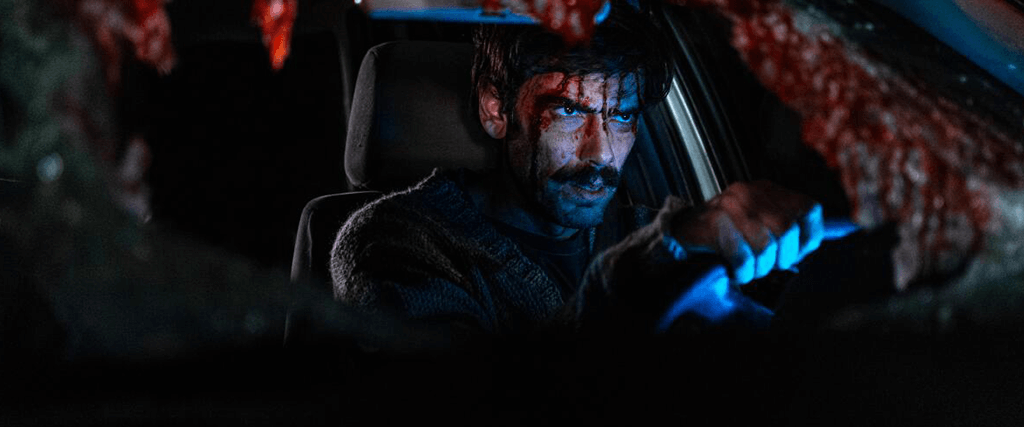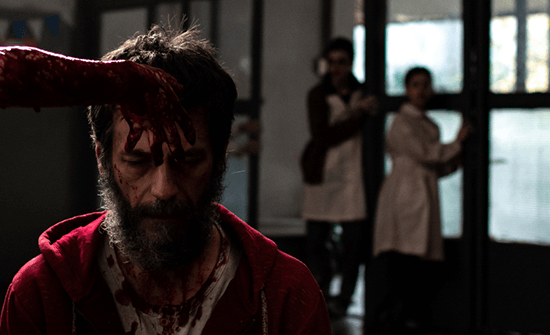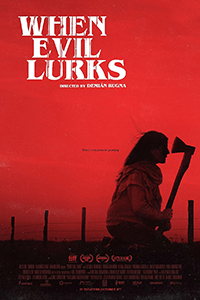
When Evil Lurks
By Brian Eggert |
No one could be blamed for feeling that if you’ve seen one demonic possession movie, you’ve seen them all. Most examples in the subgenre follow the late William Friedkin’s model, outlined in his classic The Exorcist (1973), a watershed moment in horror. Every subsequent possession movie has been a variation on that film’s structure: A young innocent is possessed. The situation brings the possessed child’s family to the brink. A specialist arrives to resolve the matter. A battle of wills ensues, shaking everyone to the core before restoring order and faith in Christian ideals. And although When Evil Lurks operates within the tired space of demonic possession movies, it shakes up the usual format. A bleak reconsideration of this cinematic material by Argentine Demián Rugna, the IFC Films release jettisons the existing formula and reconsiders possession as a disease that spreads fast, corrupting the mind and distorting the body in grotesque ways. There’s no help from the State, no help from God, and no help from the Church. When one woman pleads for assistance with her child, she’s told, “Churches are dead.”
Rugna broke out with 2017’s supernatural shocker Terrified (Aterrado) and has since been in talks with Guillermo Del Toro about an English-language remake. While that project percolated, he contributed a segment to the horror anthology Satanic Hispanics (2022) and made When Evil Lurks, a nasty piece of work set in a world where the usual descriptors for this sort of thing don’t apply. Produced by the horror streamer Shudder, the feature premiered in the “Midnight Madness” section at Toronto International Film Festival this year, and it’s bound to earn a cherished place among genre enthusiasts, if only for its memorable imagery. Rugna, who wrote the screenplay, conceives an alternate, occasionally unclear mythology with unique rules the main characters often struggle to understand or follow. Though Rugna also touches on themes of prejudice, the State’s failure to address public threats, and paranoia about surfaces and contagion that are familiar in our post-COVID world, these thematic concerns seem secondary to the unsettling dread instilled from start to finish.
In the opening scenes, adult brothers Pedro (Ezequiel Rodríguez) and the younger Jimmy (Demián Salomón) hear gunshots in the distance from their isolated farmhouse, prompting them to take up arms and investigate. The following day, they find the grisly remains of a “cleaner,” or exorcist, who was on his way to the ramshackle home of Maria Elena (Isabel Quinteros) and her two boys. Her son Uriel is a “rotten,” and has been for a year, thanks to the local authorities ignoring the problem. Bedridden, Uriel appears bloated and covered in sores, leaking greenish-yellow pus. “Kill me,” he begs in a throaty voice, but his mother warns them what happens when you shoot someone in Uriel’s state. Apparently, a “rotten” is a sort of pupal state for a demon. Unless it’s disposed of properly, whoever puts this unfortunate person out of their misery could be cursed to kill themselves and others. The brothers seek out the local police, but they’re no help; instead, they enlist a wealthy farmer, Ruiz (Luis Ziembrowski), who wants to protect his land and so proposes driving Uriel a few hundred kilometers away and dumping him there.
 But it’s not that simple. Uriel’s possessed stench lingers, and his infection leaves traces, resulting in deeply disturbing consequences for Ruiz and his pregnant wife, involving an ominous goat and an axe. The brothers realize they’ve only made things worse and abandon their worldly goods for the suburbs to visit Pedro’s ex-wife (Virginia Garofalo), where Pedro intends to gather his two sons, even his ex and her new husband and their child, to get far away from the infection area. But once again, he only makes things worse by arriving there. It’s not until Jimmy suggests getting in touch with his old flame, Mirta (Silvina Sabater), a former cleaner, that they understand what they’re up against. She outlines several rules to survive—never use the demon’s name, don’t shoot it, don’t use electricity around it, don’t let it know you’re afraid, etc. However, the rules prove arbitrary when Rugna’s characters maintain short memories and have impulse control problems, prompting much suspense and frustration on the viewer’s part when the rules go ignored.
But it’s not that simple. Uriel’s possessed stench lingers, and his infection leaves traces, resulting in deeply disturbing consequences for Ruiz and his pregnant wife, involving an ominous goat and an axe. The brothers realize they’ve only made things worse and abandon their worldly goods for the suburbs to visit Pedro’s ex-wife (Virginia Garofalo), where Pedro intends to gather his two sons, even his ex and her new husband and their child, to get far away from the infection area. But once again, he only makes things worse by arriving there. It’s not until Jimmy suggests getting in touch with his old flame, Mirta (Silvina Sabater), a former cleaner, that they understand what they’re up against. She outlines several rules to survive—never use the demon’s name, don’t shoot it, don’t use electricity around it, don’t let it know you’re afraid, etc. However, the rules prove arbitrary when Rugna’s characters maintain short memories and have impulse control problems, prompting much suspense and frustration on the viewer’s part when the rules go ignored.
When Evil Lurks finds new and inventive ways to destabilize its audience, deploying horrifically gory scenes early in the film that implant terror for what might unfold later. The demon’s obscure gestation process and reach, bound by rules that never quite congeal to a complete understanding of the enemy’s limits, also leave us fearful. In particular, Rugna enjoys terrorizing us with children, who serve as both victims and cheerleaders for the demon. Mirta explains, “Evil likes children, and children like evil.” Case in point: One little girl endures a brutal dog attack only to later cheer with glee when she witnesses her father murder her mother. The climax also makes excellent use of creepy possessed schoolchildren who spout the demon’s lies. Alas, Rugna spends little time developing his characters into fleshed-out individuals, making the experience more about enduring one gasp-inducing fright after another, more about a constant foreboding than a meaningful journey with emotional or thematic payoffs.
Teaming with his Terrified cinematographer Mariano Suárez again, Rugna’s presentation looks sharp and cohesive, and his use of practical effects is admirably yucky (when used, the CGI looks decent). With perfect, gory timing and precise cuts by editor Lionel Cornistein, Rugna delivers intense body blows with a physical impact that produces phantom sensations, recalling Paul Verhoeven’s cinema. If only the emotional gut punches landed as hard. Rodríguez gives a worthy performance, pouring himself into scenes of panic and, ultimately, absolute evisceration. All the while, Rugna’s loose exploration of his possession mythology proves at once fresh and cleverly elusive. Still, the film doesn’t quite come together the way a horror masterpiece might scare us, move us, and drive us into contemplation all at once. But similar to Terrified, Rugna’s When Evil Lurks is a freaky ride for the duration, and perhaps that’s enough.

Unlock More from Deep Focus Review
To keep Deep Focus Review independent, I rely on the generous support of readers like you. By joining our Patreon community or making a one-time donation, you’ll help cover site maintenance and research materials so I can focus on creating more movie reviews and critical analysis. Patrons receive early access to reviews and essays, plus a closer connection to a community of fellow film lovers. If you value my work, please consider supporting DFR on Patreon or show your support in other ways.
Thank you for your readership!
Brian Eggert | Critic, Founder
Deep Focus Review







